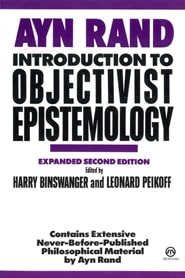

Man’s mind is able to grasp the atomic structure of water and the trajectory of a planet. What explains this enormous cognitive power, far outstripping that of any other animal? The key, Ayn Rand argues, is that man can form and use concepts.
In Introduction to Objectivist Epistemology, Rand introduces her theory of knowledge by means of its central feature, a new theory of the nature and formation of concepts. Along the way, she provides her fundamental answer to the Kantian turn in epistemology, offering a non-skeptical, non-mystical approach to knowledge.
The 1990 second edition contains edited transcripts of four workshops Rand conducted between 1969 and 1971 with professors and experts in philosophy, physics and mathematics. These extended conversations show Rand’s mind at work in real time, providing additional detail, examples, explanation and context for her theory.
— Ayn Rand, “Foreword,” Introduction to Objectivist Epistemology
Rand begins by briefly presenting the issue that a theory of concepts addresses: the “problem of universals,” as it is sometimes termed in philosophy — and indicating why traditional theories are inadequate.
“To exemplify the issue as it is usually presented: When we refer to three persons as ‘men,’ what do we designate by that term? The three persons are three individuals who differ in every particular respect and may not possess a single identical characteristic (not even their fingerprints). If you list all their particular characteristics, you will not find one representing ‘manness.’ Where is the ‘manness’ in men? What, in reality, corresponds to the concept ‘man’ in our mind?”
Rand then develops her own theory, explaining what is identical across all the instances integrated by a properly formed concept. Her view is that concept formation, in crucial respects, is a mathematical process: it relies on a form of measurement. Essential to her theory is a new account of similarity and of abstraction as measurement-omission.
She concludes with a discussion of the cognitive importance of concepts and how her theory makes possible a new approach to epistemology.
“[M]easurement consists of relating an easily perceivable unit to larger or smaller quantities, then to infinitely larger or infinitely smaller quantities, which are not directly perceivable to man. (The word ‘infinitely’ is used here as a mathematical, not a metaphysical, term.) The purpose of measurement is to expand the range of man’s consciousness, of his knowledge, beyond the perceptual level: beyond the direct power of his senses and the immediate concretes of any given moment. Man can perceive the length of one foot directly; he cannot perceive ten miles. By establishing the relationship of feet to miles, he can grasp and know any distance on earth; by establishing the relationship of miles to light-years, he can know the distances of galaxies. . . .
“In regard to human knowledge, man has to be the measure, since he has to bring all things into the realm of the humanly knowable. But, far from leading to subjectivism, the methods which he has to employ require the most rigorous mathematical precision, the most rigorous compliance with objective rules and facts — if the end product is to be knowledge.
“This is true of mathematical principles and of the principles by which man forms his concepts.”
Ayn Rand held that objectivity is not only possible but necessary for human life. That’s why she named her philosophy “Objectivism,” and it’s why she wrote a book explaining and defending the objectivity of conceptual knowledge.
In Introduction to Objectivist Epistemology, Rand offers a new account of objectivity: knowledge does not consist in passively reflecting or copying the facts of reality but in actively processing and identifying them.
The root of this new approach is a new theory of concepts, which Rand argues should be viewed as “neither revealed nor invented, but as produced by man’s consciousness in accordance with the facts of reality, as mental integrations of factual data computed by man — as the products of a cognitive method of classification whose processes must be performed by man, but whose content is dictated by reality.”
A near universal refrain is that definitions are arbitrary and subjective: they are made up, usually by someone who is trying to impose his view on others. “That’s just your definition!” we protest — with the implication that definitions are dispensable.
Ayn Rand rejects this entire approach.
“Truth is the product of the recognition (i.e., identification) of the facts of reality. Man identifies and integrates the facts of reality by means of concepts. He retains concepts in his mind by means of definitions. He organizes concepts into propositions — and the truth or falsehood of his propositions rests, not only on their relation to the facts he asserts, but also on the truth or falsehood of the definitions of the concepts he uses to assert them, which rests on the truth or falsehood of his designations of essential characteristics.”
The rules for forming proper definitions, Rand argues, stem from the nature of concepts.
Most philosophers regard the question “Is consciousness aware of the external world?” as valid. But Rand argues that a new approach to epistemology must begin by rejecting this question as invalid.
“Consciousness is the faculty of awareness — the faculty of perceiving that which exists. . . .
“Directly or indirectly, every phenomenon of consciousness is derived from one’s awareness of the external world. Some object, i.e., some content, is involved in every state of awareness. Extrospection is a process of cognition directed outward — a process of apprehending some existent(s) of the external world. Introspection is a process of cognition directed inward — a process of apprehending one’s own psychological actions in regard to some existent(s) of the external world, such actions as thinking, feeling, reminiscing, etc. It is only in relation to the external world that the various actions of a consciousness can be experienced, grasped, defined or communicated. Awareness is awareness of something. A content-less state of consciousness is a contradiction in terms.”
Epistemology studies the nature and means of human knowledge. In Ayn Rand’s view, it is a vital subject.
“Man is neither infallible nor omniscient; if he were, a discipline such as epistemology . . . would not be necessary nor possible: . . . Man is a being of volitional consciousness: beyond the level of percepts — a level inadequate to the cognitive requirements of his survival — man has to acquire knowledge by his own effort, which he may exercise or not, and by a process of reason, which he may apply correctly or not. Nature gives him no automatic guarantee of his mental efficacy; he is capable of error, of evasion, of psychological distortion. He needs a method of cognition, which he himself has to discover: he must discover how to use his rational faculty, how to validate his conclusions, how to distinguish truth from falsehood, how to set the criteria of what he may accept as knowledge.”
Rand writes elsewhere that “on every fundamental issue, Kant’s philosophy is the exact opposite of Objectivism.”
In Introduction to Objectivist Epistemology, Rand challenges the root premise of Kant’s epistemology and advances her radical alternative.
“The implicit, but unadmitted premise . . . is the notion that only an ineffable consciousness can acquire a valid knowledge of reality, that ‘true’ knowledge has to be causeless, i.e., acquired without any means of cognition.
“The entire apparatus of Kant’s system, like a hippopotamus engaged in belly-dancing, goes through its gyrations while resting on a single point: that man’s knowledge is not valid because his consciousness possesses identity. . . .
“This is a negation, not only of man’s consciousness, but of any consciousness, of consciousness as such, . . . As Berkeley negated existence by claiming that ‘to be, is to be perceived,’ so Kant negates consciousness by implying that to be perceived, is not to be.”